Improving my evil plans for Emacs
Posted: - Modified: | emacs, sharingMwahahaha. My evil plans are yielding results, or at least that’s the impression I get because I’m learning so much from people who tell me that they found my blog helpful years ago. Even more recent experiments bear fruit: punchagan checked out Memacs because of my Emacs Chat with Karl Voit, and ended up writing a blog post about using the Emacs profiler.
2015-01-17 My Evil Plans for Emacs are yielding results – index card #emacs #sharing
This makes me curious: What am I doing right, and how can I do it even better?
Looking at my Emacs posts, it seems I mostly write about figuring things out (and occasionally about cool things I’ve come across). People like the enthusiasm, and they sometimes pick up cool ideas too. The Emacs Hangouts and Emacs Chats are my way of working around my limitations; I don’t particularly like travel and I’m not up to organizing in-person meetups, but virtual meetups let me reach out to more people (and we can record the conversations more easily, too).
What are my goals?
- I want to get better at using Emacs, because it’s useful and it tickles my brain
- I want to help more people become intermediate and advanced users of Emacs, because then I get to learn from them (and also Emacs thrives as a community). I can do this by:
- Showing people the benefits and possibilities of customization
- Working out loud, showing my thought processes and the tools/libraries I use
- Helping people develop a good mindset and handy skills
- Sharing little tips and neat functions
How can I get even better at helping the Emacs community?
2014-04-26 Helping the Emacs community #emacs
I really like the way (or emacs has daily Emacs snippets and Rubikitch describes Emacs packages in Japanese. I think I’ll slowly ramp up from once-a-weekish Emacs posts to maybe twice or three times a week. I have more posts already scheduled, but I just spread them out so that my non-geek readers don’t get overwhelmed.
Guides
Because I’m interested in things that tend to be idiosyncratic (workflows, customizations, etc.), I have a hard time making clear recommendations or putting tips into logical order. That’s probably why I do a lot more “thinking out loud”-type posts instead. I can experiment with identifying who might find a tip useful, extract the tips from my thinking-out-loud explorations, and gradually build up sets of related tips that way.
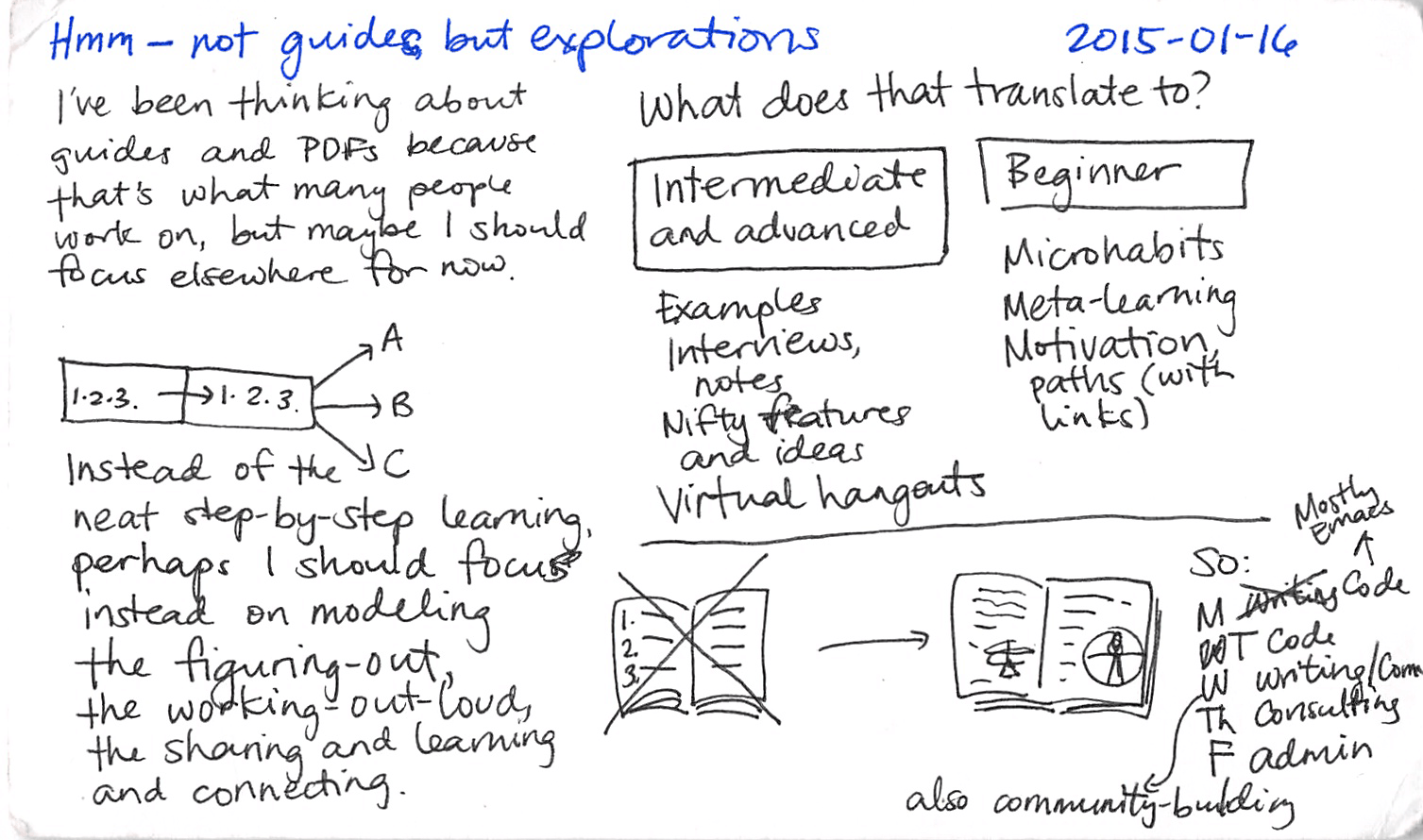
2015-01-16 Hmm – not guides but explorations – index card #sharing #packaging
I did actually manage to put together one guide (How to Read Lisp and Tweak Emacs) and half of another A Baby Steps Guide to Managing Your Tasks With Org. The sketches for How to Learn Emacs and Tips for Learning Org Mode are high-level guides, too.
Microhabits
I’ve been going back to the basics, working on developing even better Emacs microhabits. I’ve focused on two so far: abbreviating text and switching windows.I think there’s plenty of space to improve even in terms of taking advantage of what’s already out there (with minimal configuration along the lines of setting variables and keyboard shortcuts). And then there are even bigger opportunities to improve through customization and Emacs Lisp.
Helping people directly
I’ve mentioned coaching a few times. Bastien Guerry and a few other folks offer coaching as a service. Me, I’m not particularly familiar with the kinds of issues people run into or are curious about (ex: Mac OS X, programming mode setup). I’m mostly curious about workflow, and I’m happy to talk to people about that. It could be a good source of ideas for blog posts.
2015-01-08 Imagining coaching or guiding others – index card
When I ran my Google Helpouts experiments, I turned many of those tips into blog posts. I think that would be even more effective if people wrote up those tips themselves (it’ll reinforce their learning and it will bring them into the community), so I’ve been playing with the idea of strongly encouraging or even requiring write-ups.
2015-01-15 What if I required people to pay it forward – #workingoutloud #sharing #teaching
Unrealistic, but one can dream. Or one can focus on helping people who are already sharing their questions and ideas in blog posts or discussion forums, so that’s another approach. There’s no shortage of questions, that’s for sure.
Hangouts
I like Emacs Hangouts more than one-on-one coaching. Hangouts are public and recorded automatically, so people can learn from them even if no one has posted notes. It’s shaping up to be a wonderful peer-coaching sort of thing, which is good because I don’t have to be so worried about not being able to help at all. I wonder what this would be like with a bit of a mastermind group structure; maybe we each pick a microhabit or idea to work on for the month (or for two weeks), we help each other out, and then we report back at the next one. That way, there’s casual conversation and discovery, but there’s also purpose and motivation.
Connecting with more parts of the Emacs community
Evil-mode users are a growing part of the Emacs community. Maybe I should try it out to get a better sense of what the experience is like for people who are coming into Emacs via evil-mode. Besides, composability might be an interesting mental tool to add to my toolkit.
2015-01-18 Thinking about evil-mode and Emacs – index card #emacs
Wrapping up
Maybe I can get better at helping the Emacs community by:
- Focusing on those micro-habits and sharing what I learn (good for helping intermediate users develop a better appreciation of Emacs)
- Playing with more workflow improvements and sharing them
- Writing about how to tinker with popular packages like Org
- Reaching out through blog comments and Emacs Hangouts to help people learn (in a publicly recorded way)
- Bringing out what people know through Emacs Hangouts and Emacs Chats (especially if people know cool things but haven’t gotten around to writing about them)
Helping me get better at helping the Emacs community (my selfish reason: so that I learn more from people) can also support your evil plans (your selfish reason: so that you can learn more from me and from other people). Any suggestions? Tell me what I’m doing right and should do more of / better at, or tell me about somewhat adjacent things that are easy to do – low-hanging fruit! =)

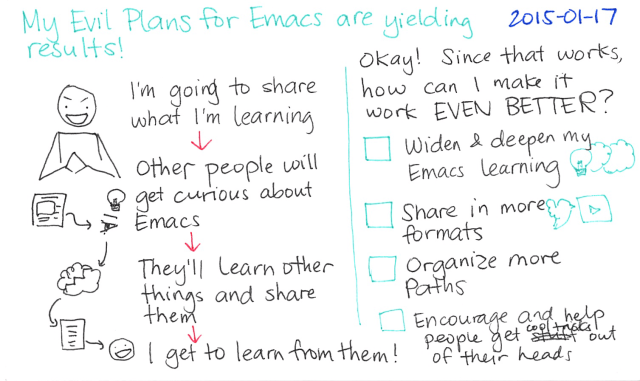
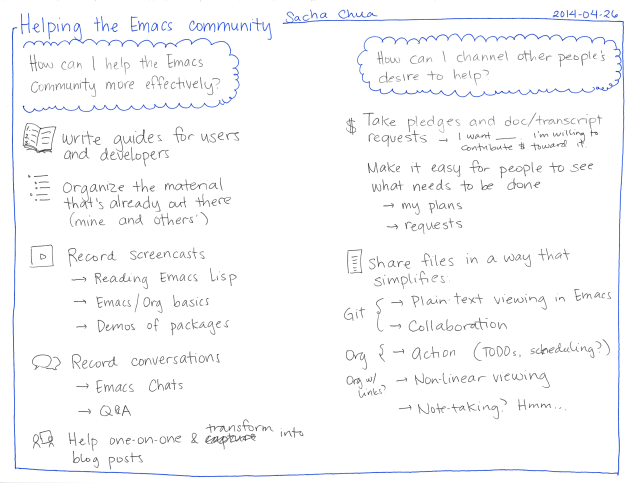
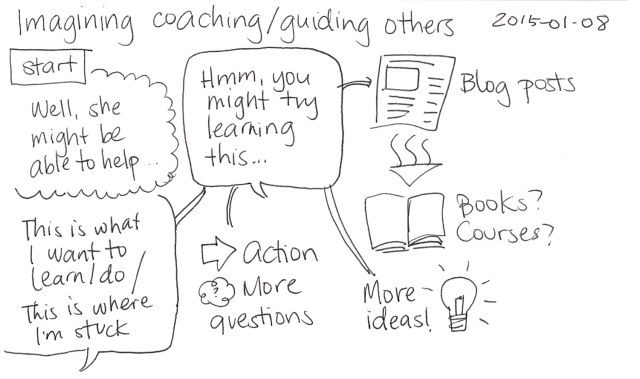
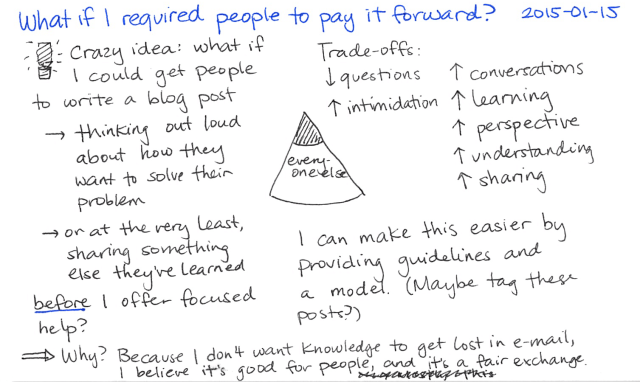
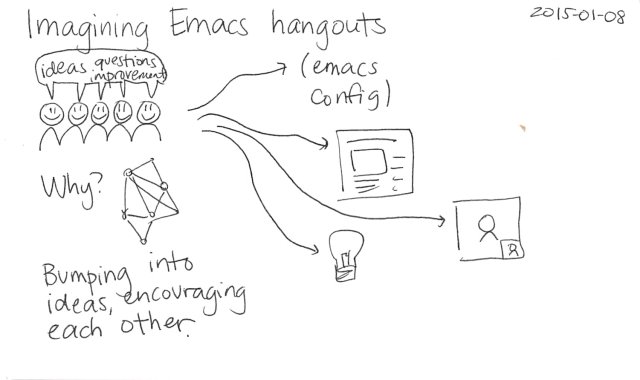
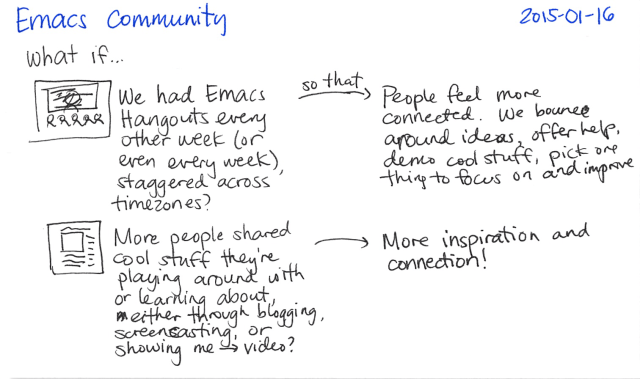
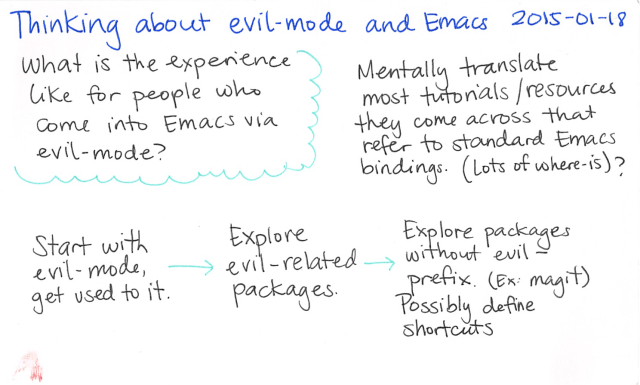
6 comments
venizio
2015-01-19T19:05:57Zhi sacha,
do you find any shortcomings from running emacs on windows? as opposed to linux/osx? any feature you are missing?
thanks.
sachac
2015-01-26T19:29:10ZIt's the little things, I think. Git takes longer because of the filesystem. Flycheck and other tools are tricker to set up. Mail is probably completely hopeless. Emacs is definitely more fun on a Unix or Linux system!
JoelMcCracken
2015-01-20T17:31:05ZThe dangling parenthesis in the name for '(or emacs' is making me crazyyyyy
sachac
2015-01-26T19:28:18ZI knooooooow!
JoelMcCracken
2015-01-20T17:45:14ZDeveloping the Emacs community is a great goal.
I worked with a professor at one point who used Emacs, and I was talking about what package.el was going to enable (this was before it was released). He said he liked the idea, but there is a certain "man on an island, sink or swim" aspect that he liked about Emacs.
I get his point, but I think the end result of sharing and improving things is much more exciting and powerful than keeping your knowledge to yourself and fostering that as a community ideal.
sachac
2015-01-26T19:28:08Z<laugh> I've never felt on an island when it comes to Emacs. In fact, I feel it's incredibly social. My experience is infused with other people's code, other people's workflows... It's almost like being in a constant conversation about how to work better. =)